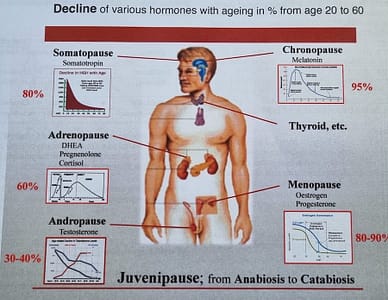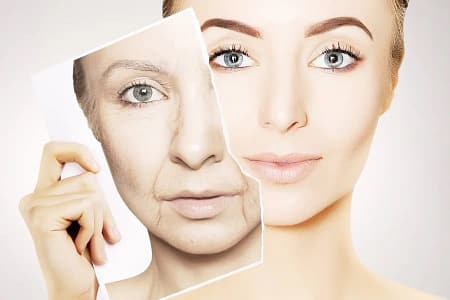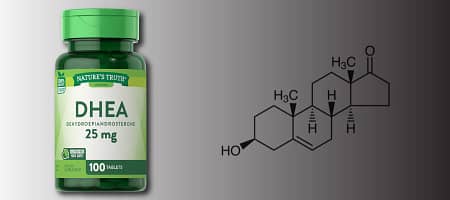Hormones have a crucial role in our everyday functioning. Many people forget that it’s the hormones that make us youthful, can make us happy or sad and play an inextricable role in our longevity. Dr H. Rensburg, bariatric physician and hormone specialist, delves into the nitty-gritty of how our bodies use these hormones, how to have the correct hormone replacement therapy protocols and why these small protein molecules affect us so much. To date, the best-known protocols for a long and youthful life are a good diet (KEY Nutrition approved), clean lifestyle habits and hormone therapy where needed.
It is always advised that you first consult your own medical doctor before trying any new medical advice or protocols.
Dr H. Rensburg
The pea-sized, light-responsive pineal gland is buried in the middle of your brain 3-4″ behind the centre of your eyebrows. For most of the 20th century the pineal was believed to be a left-over and of little interest, even though it is the first organ to develop in the foetus, being discernible about three weeks after conception. Ancient wizards, free to think beyond the statistical rules that have restricted research for much of the last 100 years, called the pineal the “third eye”, and imbued it with great powers over mood, sexuality and consciousness. Recent science shows that the ancients were pretty close to the truth.
In 1958, Aaron Lerner, a dermatologist at the Yale University, discovered that the pineal secretes a powerful hormone, which he named melatonin.2 It took another 20 years to establish that melatonin is the circadian pacemaker of the human body, without which you would lose the temporal organisation of the hormone cascade, with consequent progressive degenerative changes in the brain and other organ systems.2
Though it cost Yale over 10 million dollars for Lerner to first isolate and then synthesise a few milligrams of melatonin, the ingredients for this hormone are so simple, it now costs only cents to make. Because of its near zero toxicity,3 melatonin has become commonplace in public use, both as a sleep aid and to combat jet lag, for which purposes it works reasonably well. Consequently, many folks think of this most powerful hormone merely as a trivial remedy. To redress the balance, I want to document a few of the ways in which melatonin absolutely controls human and animal lives.
In animals that are seasonal breeders, including birds, melatonin controls their annual cycle, from the sprouting of antlers in deer, to animal and bird migrations, to sexuality and reproduction, to seasonal changes in fur and plumage, even birdsong. In the low light of winter, melatonin rises to lower testosterone, and shrivel the gonads of male animals, and eliminate the
menstrual cycle, and dry the mucous membranes of females. It also changes body odour and other sexual cues, thereby reducing sexual behaviour to near zero.4
Because we disrupt our circadian rhythms (and those of our domestic animals) with artificial light, modern humans (and their pets) can breed anytime, and scientists used to believe that human reproduction was no longer under melatonin’s influence. No way! Inuit women, who live in the traditional way, stop. menstruating when the dark winter months of the North greatly raise their melatonin. The return of daylight in spring lowers melatonin, allowing the menstrual cycle to re-start and return them to fertility.
Even in Western Society, in both males and females, testosterone and oestrogen are depressed by the high levels of melatonin released in winter. There is a sound scientific basis for seasonal affective disorder (SAD), which is relieved by sitting under lights that mimic bright natural sunlight and thereby lower melatonin. Come spring and sunshine, melatonin drops, and SAD disappears. In all of us testosterone, oestrogen, emotional tone, and sexuality all rise promptly with spring, giving strong scientific support to the old adage, “a young man’s fancy lightly turns to thoughts of love.”6
Low Melatonin Promotes Disease
At age 25 melatonin output is about 50 pg/ml per day. By age 50 it drops to about 20 pg/ml, and to 10 pg/ml by age 70, too low to maintain circadian rhythms. Every night a 10-year-old produces a few 100% increase more melatonin than a 50-year-old. Lack of sufficient melatonin is one big reason why many people over 40 don’t sleep well: hence its popularity as a sleep aid. But insomnia is a minor disturbance compared with the huge degenerative changes taking place in every organ and system in the body, because they have lost their melatonin timing mechanism.7
Benign prostatic hypertrophy (BPH), for example is present in most men over 50, and many remedies are used to prevent the night disturbance of the urine cycle. Yes, even your bladder has a cycle driven by melatonin, and low melatonin is now firmly linked to frequent night urination. In a recent study representative of the evidence, men given just 2.0 mg of timed-release melatonin at night, experienced immediate relief of symptoms.8
Low melatonin levels are also linked to low- immunity and susceptibility to colds, flues, pains and sprains, bruises and contusions and degenerative diseases too 9. One of the nastiest diseases now linked to melatonin decline is rheumatoid arthritis. in which your immune system turns on you and attacks healthy flesh. Despite a mass of experimental evidence on animals, stretching back some 20 years, this link is still not considered in conventional treatment of rheumatoid arthritis. I include it here in the hope some folk will pick up on it.
In a nutshell, when rheumatoid arthritis is experimentally induced, the immune system becomes disordered via a melatonin pathway through the autonomic nervous system to the lymph nodes when melatonin is low. The immune system goes out of control. Pre-treatment with physiological doses of melatonin (you don’t need much) prevents this disorder. It is likely that melatonin is the main synchroniser of immune function; essential to keep it within the healthy limits it was designed for.10
Even more serious is the initiation and rate of growth of certain cancers is linked to disrupted circadian rhythms. Medical research now terms this previously unknown cause of cancer chrono- disruption. It is now linked to the higher rates for certain cancers in night-shift workers, those who travel across numerous time zones for their work, and others whose age or lifestyle choices result in damage to the pineal gland’s ability to make melatonin.11
Women who live in neighbourhoods with large amounts of night-time illumination are more likely to get breast cancer than those who live in areas where nocturnal darkness prevails, according to an unusual study that overlaid satellite images of Earth onto cancer registries.
The finding adds credence to the hypothesis that exposure to too much light at night can raise the risk of breast cancer by interfering with the brain’s production of a tumour-suppressing hormone namely melatonin.
Worst of all, low melatonin devastates the brain. It is one of the main endogenous brain antioxidants that protect our brain cells from free radicals. 12 More than that, new research shows that melatonin also supports human cognition, and that chronic low levels of melatonin are linked to neurodegenerative disease.
We know, for example that chronically low melatonin promotes depression.12 Alzheimer’s patients also have chronically low melatonin.14 So strong is melatonin’s control of the temporal patterning of neural and endocrine structures in the midbrain, it is now considered a major organiser of cognition.15
Human and animal experiments have indicated that melatonin deficiency may contribute to diseases such as high blood pressure (arterial hypertension). heart disease, jet lag, “obesity” (HAS), diabetes, osteoporosis, colitis (due to lower immunity), breast and prostate cancer. Alzheimer’s and Parkinson’s disease.
MELATONIN SECRETION OVER 70-YEAR LIFESPAN

Melatonin decline coincides with the increase of degenerative disease of ageing.
Melatonin Correction
I hope this brief sketch is sufficient to convince you of the importance of melatonin. In fact, nobody should start any corrective hormonal therapy (CHT) without melatonin.
The exact dose of melatonin to use is difficult to determine. There is likely a wide range of individual differences and needs, depending on age, health, genetic tendencies and environmental light levels.
- Men require more melatonin than women.
2. Need increases with age.
3. Because of differences in the pattern of melatonin release at night, some people require timed-release melatonin, others require sublingual rapid-release melatonin, and still others require a combination of the two.
4. If you take melatonin, you must do it very consistently, every night, right at bedtime. Irregular use or timing interferes with sleep patterns, and very likely with the function of multiple organs and systems.
5. Buy only trusted brands. Some “melatonin” isn’t true melatonin.
Fortunately, melatonin is only available on prescription in Australia unlike the USA where it can be bought over the counter for self-treatment. Melatonin has an influence on a wide range of other hormones and their activities. Melatonin increases growth hormone and calms down the activity of cortisol. It also increases conversion or the poorly active T4 thyroid hormone into the active thyroid hormone T3.
Therefore, knowledgeable medical supervision and follow up is essential for melatonin corrective therapy.
Note
Hormones have a mystique about them and CHT is controversial in certain circles, and you will come across this. The main criticisms are usually from people who did not study, have not been trained in this field or who have other agendas. In many ways it is political rather than scientific.
You will often be told that a certain hormone can cause this or that side effect. All hormones have side effects if it’s too low or too high. CHT (Corrective Hormonal Therapies) only brings hormones to their normal youthful levels and there should be no side effects other than beneficial if done properly.
Dr Hendrik v Rensburg MD MA, MB Bch. BAO (TCD) M.R.C.S. (Eng) LR.C.P. (London)
Faculty Member of the International Hormone Society (IHS)
Member Endocrine Society and ESA
The Rensburg Medical Clinic
AUSTRALIA





